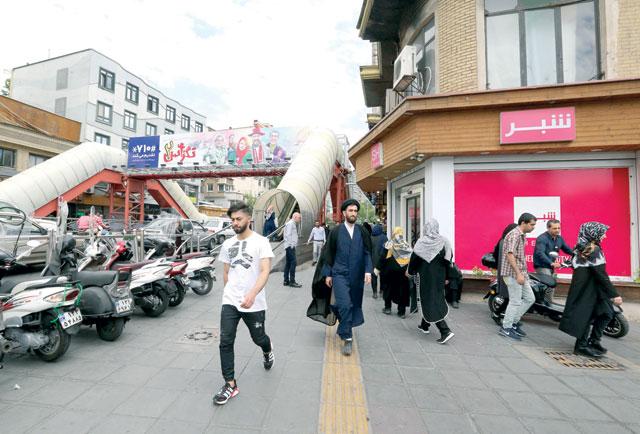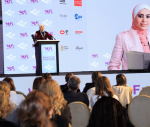You are here
German exporters eye lucrative deals in post-sanctions Iran
By Reuters - Jul 06,2015 - Last updated at Jul 06,2015
FRANKFURT/BERLIN — Martin Herrenknecht, founder of a company in southern Germany that is a world leader in tunnel-boring equipment, has been carefully preparing for the day when Iran reopens for business.
He recently visited Tehran, meeting officials in the energy ministry and sewage department. Before Western sanctions hit, Herrenknecht, which carries its 72-year-old founder's name, did 10 million to 15 million euros ($11 million-$17 million) of business a year in Iran.
It has maintained an office there, anticipating a day when Iran reaches a nuclear deal with major powers that will put lucrative projects like a long-delayed expansion of the Tehran metro back on track.
"I know what projects are coming and I'm ready to sign when the sanctions are lifted," Martin Herrenknecht told Reuters.
Like a host of other German companies, many of them small-to-medium sized "Mittelstand" firms, Herrenknecht, based in Schwanau in prosperous Baden-Wuerttemberg, is gearing up for a return of the Iranian market.
As talks about a deal with Iran approach a Tuesday deadline, a senior German official said: "It's like a regatta. Everyone is trying to put themselves in the best position to be first when the starting gun sounds."
"They are trying to assess whether the old relationships are still valid. Can they rely on the people they know or do they need to build new relationships?" he added.
Germany has commercial and cultural ties to Iran that go back to the 19th century.
Unlike Britain and Russia, Germany had no imperialist history in the region, making it an attractive partner, and by the late 1930s German firms were involved in almost every major industrial project in Iran including the Trans-Iranian Railway.
But during the years of sanctions, China, the United Arab Emirates, South Korea, Turkey and India have overtaken Germany in Iran trade. German exports to Iran fell from a high of 4.4 billion euros in 2005 to 1.8 billion in 2013.
The German official mentioned Volkswagen and Daimler as among those jostling for position.
Volkswagen (VW) said it had not restarted any business activities in Iran and Daimler said it was closely monitoring the situation although any transactions or re-entry into Iran would depend on the outcome of the nuclear talks.
But a person familiar with the situation at VW, Europe's biggest carmaker, said: "Of course there are talks," adding that the same applied to all potential suppliers. "It's done rather behind the scenes to see what levers one will need to pull."
Pressure
Iran's private sector has been shrivelled by the sanctions, which limited its access to foreign trade, and is hungry for foreign investment and expertise. Its economy is dominated by oil and gas exports and the public sector.
But most executives of publicly listed German companies are still cagey about their interest in Iran, mindful of investors and customers in the United States, which takes a harder line on sanctions than Europe does.
Trains-to-turbines group Siemens, whose history in Iran goes back to the 1867 Indo-European telegraph, stopped doing new business there in 2010 after being slammed for selling equipment that was used to spy on dissidents.
It never gave a reason for its decision but sources familiar with the matter say the Iranian connections had made it harder to win public contracts in the United States.
A Siemens spokesman remarked this week that the company was waiting for an outcome of the nuclear talks before making any decisions about how to proceed there.
"If something changes, we'll deal with it," he said.
The issue is a thorny one for German politicians too, who are anxious to keep up the pressure of sanctions to make sure a deal is done, while not disadvantaging German industry.
Economy and Energy Minister Sigmar Gabriel is said in Berlin circles to be planning a trip to Tehran this month but the visit has not been confirmed by his ministry.
Outspoken business owners like Martin Herrenknecht, who has built his business from scratch to a billion euros in a few decades, are a nuisance for officials striving for a balance.
A source close to the government recently explained the dilemma: "German industry really wants to pile into Iran. They're worried that if they wait, the French or even Americans will get in before them.
"But if they go in now, the Iranians may decide they don't need a deal as the sanctions are effectively falling away without it," he said. "We are using all opportunities to tell German industry to calm down."
Elsewhere, Iran's transport minister said recently that there was about $80 billion worth of business up for grabs in his sector, including the renewal of the country's air fleet, but warned France it risked missing out unless it changed its stance towards Tehran.
France is one of six world powers negotiating with Iran over its disputed nuclear programme and has been one of the toughest in pressing for restrictions to prevent it from acquiring an atomic bomb, although it denies seeking one.
All sides are seeking a deal that would reward Iran with relief from international sanctions, meaning it could soon collect debts from overseas banks that may exceed $100 billion.
That has prompted an Iranian diplomatic charm offensive across the world as it looks to attract companies to invest across all sectors, from its ageing hydrocarbon-based energy system to transport and general construction.
"There is no Iran strategy in France, and this is a source of regret," Transport Minister Abbas Ahmad Akhoundi told a conference at the International Diplomatic Academy in Paris. "Sooner or later the nuclear conflict will be resolved and France needs to decide on its position now."
Akhoundi was speaking during the Paris Airshow, where he has been holding talks with executives from French firms including Thales and European planemaker Airbus.
He said Tehran would prioritise civil aviation once sanctions were eased because its ageing fleet risked being "out of service" within the next 10 years.
"We are thinking about regeneration of our air fleet... 300-400 more aircraft worth a minimum of $20 billion," he indicated.
Iran's ambassador to France last month told journalists that Tehran was already negotiating with American firms including Airbus' main US rival Boeing.
Akhoundi declined to comment on that, but said that despite some "dogmatic" views in the West, Tehran did not plan to take retaliatory measures when contracts were eventually awarded.
"There will be international competition, but we will never allow ourselves to be dominated economically by the West again," he said.
Akhoundi indicated that potential investment in the transport sector included $25 billion on improving its rail infrastructure and $30 billion on roads and motorways.
France is considered to be demanding more stringent restrictions on the Iranians under any deal than the other Western delegations, officials have said, although US officials have cautioned that Paris' position privately is not as tough as it is publicly.
A senior French government official said he was not worried about missing out in Iran.
"It's not because you're the first one in that you're the first served," he said. "We'll be ready. Don't worry about French firms."
Related Articles
DUBAI — Iran ordered a steep increase in oil output on Monday to take immediate advantage of the lifting of international sanctions, and som
TEHRAN — Iran said Sunday it will buy 114 Airbus planes to revitalise its ageing fleet, in the first major commercial deal announced since t
BERLIN — European countries said on Thursday they wanted to preserve Iran's nuclear deal and rejected "ultimatums" from Tehran, after Iran s

















